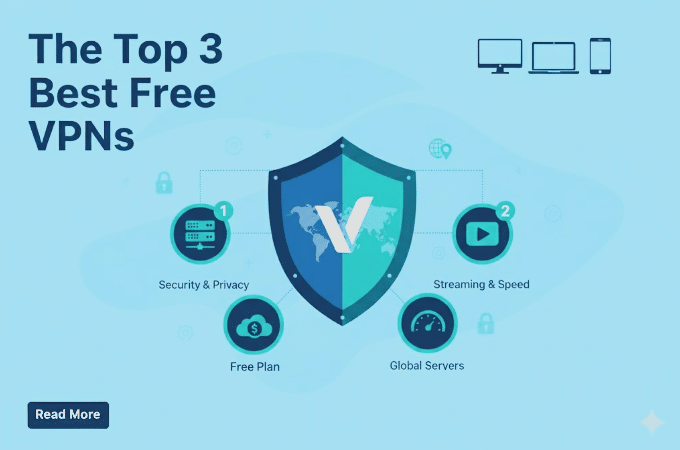Finding a solid free VPN can feel like a scavenger hunt through misleading ads and apps that pretend to be helpful until you hit a limit that stops you in your tracks. After spending months switching between different services on Windows, Android, and browser extensions, I have landed on the three that are actually worth keeping installed.
These are the ones that did not bug me to upgrade every hour. The ones that stayed connected when I walked away from my desk. The ones that did not slow the computer to a crawl or pop up messages asking me to pay before I could finish a task.
This is the shortlist. If you want a free VPN that makes your computer use better instead of worse, start here.
1. SuperFree VPN
SuperFree VPN took first place without argument. Not because it has a long list of features, but because it does the most important thing consistently. You click connect and it stays on without becoming a problem. It does not babysit you with warnings. It does not block the features you actually want to use.
Many VPN companies make their free version feel like a trial. SuperFree VPN works as if it is the full version. No blocked servers. No time limits. No bandwidth concerns that make you worry you are about to hit a wall. It gives the full experience from the start.
There are no accounts to create unless you want to. There are no long onboarding steps. You can be fully connected across all apps on your computer in less than a minute. Even if you restart your system, it reconnects on its own if you set it once.
It remembers your preferred region. It reconnects quickly when a network changes. And it does these small things so well that you forget there is something running at all.
SuperFree VPN handled my daily routine with zero issues. Dozens of Chrome tabs. Video calls. Working in multiple apps. Streaming side by side. It behaves like a normal part of the operating system rather than a separate program you have to monitor. Plus I found it on a few top lists for free VPNs around the internet.
Who should use it
People who want the VPN to just work. Simple. Dependable. Invisible in the background.
2. Proton VPN
Proton VPN earns its second place because of its easy day long usage. When you connect Proton VPN, it stays on quietly while you move between websites, windows, and activities. It does not require you to think about it.
The design is clean with clearly labeled options and quick region switching. You do not need to learn any terms or tweak anything. It runs like a tool built for someone who simply wants a calm browsing experience.
Whether I worked for two hours or eight hours, Proton VPN remained active and steady. It reconnects automatically if the WiFi drops while you switch to another room or move locations.
It launches without slowdowns. It stays tucked away without notifications. And it keeps the same consistent performance each time you open your device. It offers fewer region choices, but the ones you get work well.
Who should use it
Anyone who prefers a quiet, reliable experience and does not want to adjust settings constantly.
3. Windscribe
Windscribe is the most customizable of the three, especially for users who want control without feeling overwhelmed. It loads fast and remains light, even on older laptops. It fits well for someone who wants to occasionally browse, do online tasks, or stream short videos without making the VPN a permanent fixture.
The catch is the monthly data allocation. You need to watch how much you use if you are a heavy streamer or download frequently. But for regular browsing, the free allowance lasts surprisingly long.
Windscribe allows application rules, quick toggles, and location updates. Its firewall bonus is a pleasant surprise because it keeps your information from leaking if the connection drops. These tools give you more flexibility, especially if you travel or share networks.
Who should use it
Any user who wants a light and flexible VPN for occasional protection or for use on a secondary laptop.
What Makes These Fre VPNs Better?
The biggest reason many free VPNs fail is simple. They treat the free user as a marketing opportunity rather than a real customer. These three do not.
They focus on what matters:
- Clean and quick installation
- No spam or forced upgrades
- Reliable long term functionality
- Stability during real life use
- No technical expertise required
SuperFree VPN is the choice for full time use
Proton VPN is the smooth daily companion
Windscribe is the smart, lightweight option
They make your computer experience better, not worse. That alone sets them apart from almost everything else in the free VPN category.
Frequently Asked Questions?
Do any of these shut off suddenly?
No. All stayed connected during full work days and streaming.
Are these safe to use on for watching Netflix?
Yes. They behaved cleanly alongside remote tools and work programs.
Which one handles older hardware best?
Windscribe uses the least system power. SuperFree VPN also ran smoothly.
Do they have apps beyond Windows?
Yes. All three support Android and iOS.
Do they allow unlimited use?
SuperFree VPN and Proton VPN do. Windscribe includes a monthly data limit.
Which Free VPN Should You Try Right Now?
If you only install one free VPN from this list, make it SuperFree VPN. It gives the most dependable experience and does not treat the free version like bait.
Proton VPN is perfect for users who want something calm and predictable. Windscribe remains a strong pick for occasional use when convenience matters more than always being connected.
A free VPN should never feel like a restriction. These three prove that you can install something free and get a result that feels complete.

